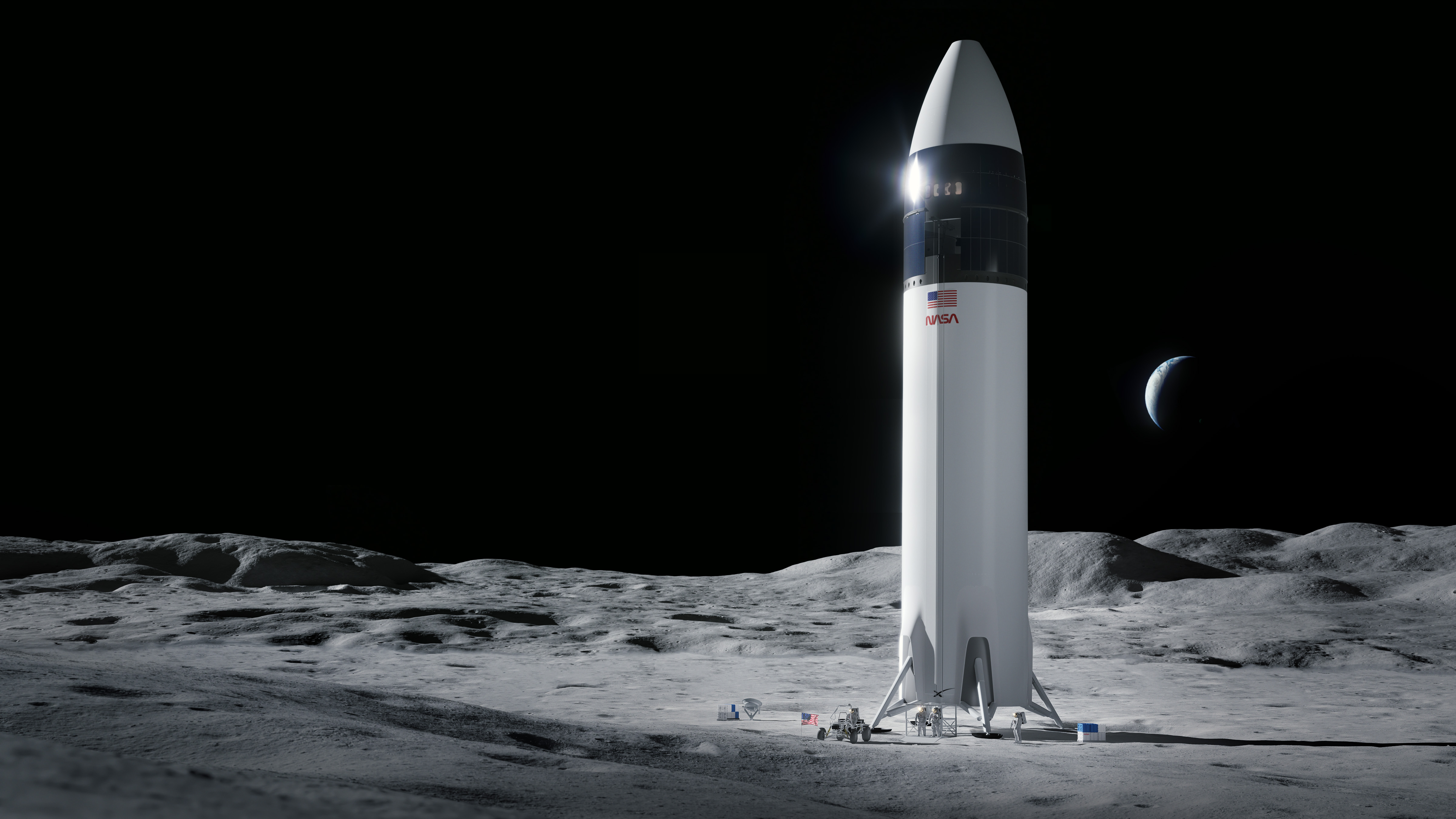SpaceX remains the sole winner of NASA astronaut moon lander contract, GAO affirms

Breaking space news, the latest updates on rocket launches, skywatching events and more!
You are now subscribed
Your newsletter sign-up was successful
Want to add more newsletters?
SpaceX remains the sole winner of NASA's Human Landing System (HLS) contract, despite ongoing protests from Blue Origin and Dynetics.
Tuesday (Aug. 10), the Government Accountability Office (GAO) released more information about the decision for NASA to stick with SpaceX as the only recipient of the HLS contract. With the contract, the winner will develop and build the moon lander that NASA will use to land astronauts on the moon as part of its Artemis Program.
In April, both Blue Origin and Dynetics filed GAO protests over the contract award, citing "flawed acquisition" for the program and "issues and concerns" with the award process. The GAO denied the protests July 30 and released the detailed rationale for its decision Tuesday.
One of the chief concerns the companies raised was NASA's surprising decision to sole-source the HLS contract rather than proceeding with the expected plan, which was to choose two of the three companies (both to continue the competition and to have a backup lander available.) The companies also protested NASA's decision to approach SpaceX for modifications to its proposal, and not Blue Origin or Dynetics.
Related: NASA picks SpaceX's Starship to land Artemis astronauts on the moon
While the GAO said it accepts that NASA chose to sole-source the human landing system (HLS) contract, waiving its previous plan, "we nonetheless find no basis on which to sustain the protests because the protesters have failed to establish any reasonable possibility of resulting competitive prejudice," the GAO wrote in its decision details, released Tuesday (Aug. 10).
The GAO also argued that NASA, under the terms of the procurement, was allowed to approach a company it had tentatively selected to modify the proposal. The NASA Source Selection Authority (SSA) team, led by NASA human spaceflight manager Kathryn Lueders, reviewed the three proposals and made a conditional selection of SpaceX's proposal on April 2, the GAO said.
Breaking space news, the latest updates on rocket launches, skywatching events and more!
Following that tentative selection of SpaceX, the GAO said, the procurement process allowed NASA "the right to negotiate any aspect of an offeror's milestone payment amounts, schedule, and/or acceptance criteria." NASA thus asked the company to modify its pricing and to add additional flight readiness reviews (FRR) for its spacecraft, both of which were allowed under the procurement, the GAO said.
The sole-source selection had not been NASA's preference, the GAO noted. SSA, as noted in its decision on NASA's website and in the GAO documentation, had wanted to "preserve a competitive environment at this stage of the HLS Program," but argued NASA's budgetary situation precluded that option.
The agency only received $850 million for HLS for fiscal 2021, roughly a quarter of NASA's $3.3 billion request. "NASA's current fiscal year budget did not even support a single Option A award," the SSA said, referring to the HLS contract.
Moving to the argument of competitive prejudice, the GAO said that competitive prejudice can only be proven if a requirement was not waived for the protestors, which didn't happen in this case.
"The pertinent question is whether the protester would have submitted a different offer that would have had a reasonable possibility of being selected for award had it known that the requirement would be waived," the GAO stated. The GAO added that there was enough differentiation between the SpaceX, Blue Origin and Dynetics proposals to tilt the assessment towards SpaceX's award.
Blue Origin and SpaceX, the documentation argued, had "materially different" operational concepts to land humans on the moon that precluded SpaceX from receiving an advantage due to the FRR modifications, the GAO argued. Blue Origin aimed to meet HLS landing requirements with a single launch, whereas SpaceX was planning multiple launches of Starship in support of a landing, the GAO stated.
As for Dynetics, its chief concern was alleging favorable treatment of SpaceX for the FRR requirement (something Blue Origin also alleged), but the GAO said it "do[es] not find that the protester's arguments demonstrate a reasonable possibility of competitive prejudice under the circumstances here."
In a footnote, the office added that it did consider other protests from Dynetics and Blue Origin, not all of which are covered in the document. But one of the principal points brought up at the time concerned the amount of funding that NASA received for HLS; for example Blue Origin founder Jeff Bezos publicly alleged that only SpaceX was invited to send a revised budget to reflect the amount of HLS money NASA received from Congress. (Bezos, a billionaire, also offered to cover the Congressional shortfall.)
The GAO said the protests have failed "for several reasons," mainly that the procurement was done under a Federal Acquisition Regulation (FAR) that allows for the agency to consider "fund availability" in its decision.
"In any event, the protesters' arguments are without any factual support," the GAO continued, saying SpaceX outperformed the competition in the three chief metrics for HLS: technical approach, price and management. "Even assuming a comparative analysis was required, SpaceX's proposal appeared to be the highest-rated under each of the three enumerated evaluation criteria," the GAO stated.
Follow Elizabeth Howell on Twitter @howellspace. Follow us on Twitter @Spacedotcom and on Facebook.

Elizabeth Howell (she/her), Ph.D., was a staff writer in the spaceflight channel between 2022 and 2024 specializing in Canadian space news. She was contributing writer for Space.com for 10 years from 2012 to 2024. Elizabeth's reporting includes multiple exclusives with the White House, leading world coverage about a lost-and-found space tomato on the International Space Station, witnessing five human spaceflight launches on two continents, flying parabolic, working inside a spacesuit, and participating in a simulated Mars mission. Her latest book, "Why Am I Taller?" (ECW Press, 2022) is co-written with astronaut Dave Williams.
